| |
Better safe than
sorry...
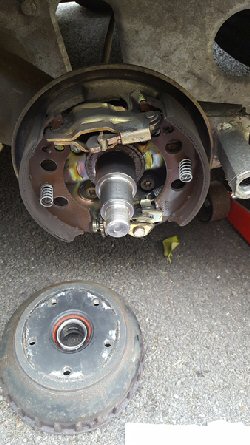 The
caravan is one of the most important and possibly the biggest expenditure in the
agility competitor's life other than vet bills! It's what's fuelled the rise of
the multi-day show and the week long agility camp. It doesn't have to be new or
fancy - after all it is for the dogs - but it needs to be roadworthy and safe
for whomever uses it. Dave Camble, owner of Diagnostic Caravans in Thame, makes a few suggestions as to things
to check before you set off to a show. The
caravan is one of the most important and possibly the biggest expenditure in the
agility competitor's life other than vet bills! It's what's fuelled the rise of
the multi-day show and the week long agility camp. It doesn't have to be new or
fancy - after all it is for the dogs - but it needs to be roadworthy and safe
for whomever uses it. Dave Camble, owner of Diagnostic Caravans in Thame, makes a few suggestions as to things
to check before you set off to a show.
Regular servicing of your caravan or
motorhome will pay off in the long run with greater reliability and improved
resale value. There are also safety and legal issues to be considered. Every
vehicle or trailer is required by law to be in such a condition as not to cause
danger to anyone. Some items you can easily check for yourself, such as tyres
and lights, but the braking system and the electrical and gas items inside the
caravan area are best left to experts if you are not to risk your safety or that
of others.
The same checks apply whether you are
taking your caravan out for the first show of the season or putting it away for
the winter. An annual service is essential and I am not just saying that because
I fix caravans. It's my business but it's your life.
The three elements of maintenance to keep
your caravan or motorhome in tip-top condition are:-
-
Annual servicing - That's the job for
professionals
-
Regular maintenance includes things you can do yourself depending upon your
level of
-
Winter preparation and maintenance
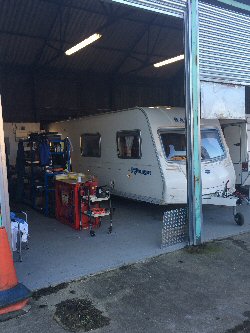 What
does a full caravan service consist of? What
does a full caravan service consist of?
A full service on a
single axle van will take approximately 3-4 hours and a twin axle around 4-5
hours. Prices quoted (£170 single axle vans and £220 twin axle vans) plus parts
i.e., hub nuts, water filter, if fitted.
Here are some things you can expect to be
done as a matter of fact.
-
The water system will be
filled, and all taps/drain cocks will be tested. The system will also be checked
for any leaks and repaired accordingly. The water system will then be drained
upon completion unless otherwise instructed by the customer.
-
A gas tightness and let
by test will be done and all appliances will be switched on in gas mode. A room
CO (Carbon Monoxide) test will be carried out over a 30 minute period. Smoke and
CO alarms will be tested and batteries will be replaced (if necessary). Low
pressure gas hose will be checked and replaced if required. High pressure hose's
(pigtails) have differing life spans dependent on manufacture/type, these are
not inclusive in the service items and will incur an additional charge. All gas
drop vents and fixed ventilation will be checked and any blockages will be
removed.
-
Any batteries contained
within igniters will be replaced free of charge (if necessary).
-
A thorough damp test
will be carried out using conventional and non-invasive damp meters and a
detailed report will be provided.
-
Cassette toilets will
have all seals and moving components lubricated and pumps will be tested.
-
A check of the vanís
electrics will be carried out and will include polarity check, insulation check,
earth bonding check and RCD load test.
-
All appliances will be
tested using 240v and 12v where applicable
-
All 240v and 12v
lighting will be tested. The vanís leisure battery will be inspected, and
charging rate will be recorded. Also, the hook up lead will be tested and
checked for damage and security of the plug and socket.
-
All windows and window
catches will be inspected and tested, window blinds will be checked and if
possible will be tensioned and re-checked.
-
On the outside of the
van a check will be made of all body panels, windows and skylights as well as
all body fittings such as TV aerials and external service hatches etc. All
functions of the 12n, 12s or 13pin plug will be tested.
-
The overrun assembly
will be tested and lubricated as well as the jockey wheel and corner steadies.
If a conventional towing hitch is fitted this will be cleaned and re-greased. If
a stabiliser hitch is fitted this will have the pads removed and cleaned.
-
All wheels will be
removed and also brake drums. A thorough clean will be carried out before
adjusting the brakes and refitting all parts (hub nuts will be replaced).
-
The tyres will be
inspected for cracks and damage and a note will be made of the tyres age, depth
of tread and pressure. The spare wheel will be removed from its carrier to be
inspected and the carrier will be checked and lubricated. All body - chassis
bolts will be checked for security. A full report, including damp and CO (CARBON
MONOXIDE) report will be produced and all security devices that have been
removed will be replaced.
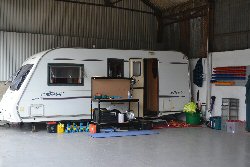 Owner
checks and routine maintenance Owner
checks and routine maintenance
Throughout the year, there are
jobs that you can to keep your vehicle in good condition. What you can attempt
depends on your level of expertise and tools, but most users can and should
tackle the following check items if not the subsequent remedial work that may be
revealed.
Check:
-
Road lights and electrical connections
between car and caravan
-
Tyre condition and pressures, including
the spare. Consider replacing any tyre more than five years old and
certainly any over seven years of age regardless of tread wear
-
Wheel rims for kerbing damage, which can
lead to deflation
-
Wheel nut tightness (50 miles after
servicing or wheel removal and before every trip). Keep a good torque wrench
in the ívan
-
Greasing of the coupling head, if it does
not have a stabiliser hitch
-
Condition of breakaway cable and clip
-
Battery charge state (use an inexpensive
multi-meter) and charge with a leisure battery charger if necessary
-
Visual condition of flexible gas hoses
and regulator connections
-
Flame colour from cooker and gas
appliances. The flame should stay blue. If yellow flames appear, consult a
workshop
-
12N, 12S (7-pin) or 13-pin connection
cables, plugs and sockets for signs of wear or looseness. Clean contacts if
necessary
-
The RCD cut-out test switch works. Check
this every time you connect to a hook-up point
-
All water hoses and check tightness of
connections
-
Ventilation and gas drop-out vents to
ensure they are not obscured by items carried in lockers
-
The stabiliser friction pads wear
indicator on the hitch if a stabiliser hitch head is fitted. If necessary
replace according to the makerís instructions.
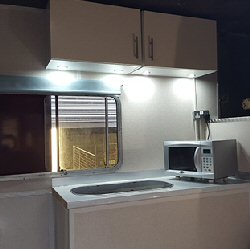 Winter
storage Winter
storage
Some people like to have their caravans serviced prior to winter hibernation.
It's the ideal time to have any damp work carried out on caravans / motorhomes.
Here are some things you should do before putting your caravan / motorhome to
bed.
-
Make sure all water
taps are left open and the water system is fully drained.
-
Double check that
all windows and skylights are shut.
-
Double check all
lockers for food stuffs and anything you donít want to leave in the van.
-
Leave the fridge
slightly open to avoid nasty smells and damp.
-
Remove battery for
over winter charging or connect solar panel for charging.
-
It is also a good
idea to place a Dehumidifier or two inside the van to attract any moisture.
-
Do not apply the
hand break as there is a possibility the breaks will seize over the damp
weather.
-
Depending on where
the van is kept you might want to remove the wheels to stop the tyres from
being weathered. If you do, keep the bolts in a safe place. Do not put any
grease in the holes!
-
It is also a good
idea to place the 12s and 12n or 13 pin plugs into a plastic bag to avoid
them getting wet.
-
Lower all
corner steadies you might want to place some wood under to stop them from
sinking.
-
If you use a cover
make sure that it is secure and tight as the wind will get into it and
rattle the straps and damage the paintwork.
-
Check all
lockers and door to make sure they are locked.
-
Donít forget
to fit any wheel clamps and security devices to your van to keep it safe
until you return.
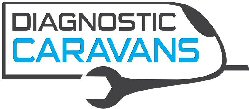
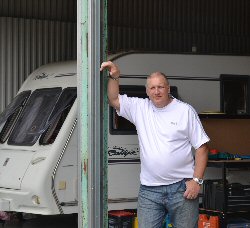 About the author... About the author...
Dave Camble owns Diagnostic Caravans. His workshop
in-between Thame and Chinnor, Oxfordshire, but also does call out services. His
premises are undercover, lockable and fully insured.
For more information, contact Dave anytime on
m. 07734 720 539 or landline (evenings)
01844 217192. Email:
dave.camble@diagnosticcaravans.com Web site:
http://www.diagnosticcaravans.com/ | |
|